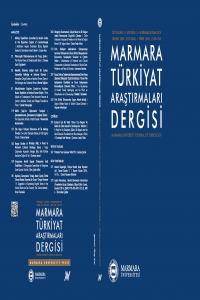Abstract
Gerek tabiî güzellikleri ve stratejik konumu gerekse tarihi önemi bakımından “şehirlerin kraliçesi” sayılan Bizans
başkenti İstanbul, tarihin çeşitli dönemlerinde Sâsânîler, Avarlar, Bulgarlar, Ruslar ve Lâtinler gibi milletlerden başka
Müslüman Araplar ve daha sonra da Müslüman Türkler tarafından kuşatılmıştır. Müslüman Araplar üçü Emevîler ve
biri de Abbâsîler’in ilk döneminde olmak üzere toplam dört defa Bizans başkenti İstanbul’a sefer düzenlemişlerdir.
Bunlardan ilk üçünde İstanbul müslümanlar tarafından kuşatılmış, dördüncüsünde ise İslâm ordusu Üsküdar’a kadar
ulaşmış ve burada Bizans’tan gelen barış teklifini kabul ederek geri dönmüştür. Bu seferler başarısızlıkla sonuçlanmış
olmakla birlikte, müslümanların Bizans İmparatorluğu karşısında ciddî bir güç olduğunu göstermiş, İslâm ordularının
kara ve deniz savaşlarında gerekli donanım ve taktik bakımından tecrübe kazanmasına imkân sağlamıştır. Bizans
açısından ise imparatorluğun gücü ve başkentin önemi bir kez daha anlaşılmış, ordunun dış tehlikelere karşı dinamik
bir şekilde mukavemet göstermesine yardımcı olmuştur.
Hadis kaynaklarında yer alan pek çok rivayet müslümanların daha Hz. Peygamber’in sağlığında, dönemin iki
süper gücünü teşkil eden Bizans ve Sâsânî topraklarının bir gün fethedileceğine inandıklarını göstermektedir. Bu
makalede Müslüman Araplar tarafından İstanbul’a düzenlenen seferler ele alınmaktadır.
Keywords
İstanbul Bizans Emevîler Abbâsîler Muâviye Ebû Eyyûb el-Ensârî Mesleme b. Abdülmelik Harun er-Reşîd III. Leon Irene
References
- Algül, Hüseyin, “Ebû Eyyûb el-Ensârî”, Türkiye Diyanet Vakfı İslâm Ansiklopedisi (DİA), X,
Abstract
Constantinople as “queen of cities” in respect to both natural beauties and strategic location and historical significance
became the target of not only nations like Sasanids, Avars, Bulgars, Russians and Latins but also Muslim
Arabs and Muslim Turks afterwards in different terms of history. Muslim Arabs launched expeditions to the Byzantine
capital of Constantinople four times in total; three times in the Umayyad period and once in the very beginning of
Abbasid period. In the first three, Constantinople was besieged by Muslims, in the forth the army of Islam reached up
to Uskudar and returned by accepting the peace offer of Byzantine. Although these expeditions failed, they showed
that Muslims were a serious power against the Byzantine Empire and provided the opportunity for the armies of
Islam to gain experience in land and sea warfares in terms of necessary equipment and tactics. From the viewpoint of
Byzantine, imperial power and the importance of the capital were understood once again that they helped the army
show resistance dynamically against external threats.
Many narratives located in the hadith sources shows that in Prophet’s lifetime Muslims believed that one day the
territories of the two super powers of the period, Byzantine and Sasanid, would be conquered. This article examines
the expeditions launched by Muslim Arab armies to Constantinople during Byzantine era.
Keywords
Constantinople Byzantium Muslim Arabs Umayyads Abbasids Muawiya Abu Ayyub al-Ansari Maslama b. Abd al-Malik Harun al-Rashid Leo III Irene
References
- Algül, Hüseyin, “Ebû Eyyûb el-Ensârî”, Türkiye Diyanet Vakfı İslâm Ansiklopedisi (DİA), X,
Details
| Journal Section | Makaleler |
|---|---|
| Authors | |
| Publication Date | January 3, 2016 |
| Published in Issue | Year 2015 Volume: 2 Issue: 2 |
MUJOT publishes scientific studies such as research articles, review articles; historiographic studies, archival and monographic source publications, scholarly translation and transcriptions, bibliography and chronologies, book and thesis reviews, interviews and obituary studies along with announcements about related subjects about Turkic World particularly in the fields of language, culture, literature, history, folklore, geography and art.


